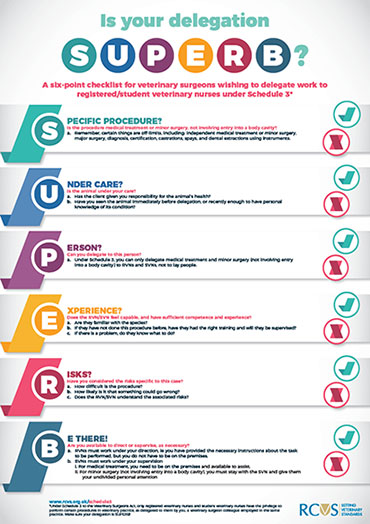‘SUPERB’ checklist poster released
The Royal College of Veterinary Surgeons (RCVS) has produced a six-point checklist poster for use in the practice setting to help veterinary surgeons remember the key things they need to consider when delegating work to veterinary nurses under Schedule 3.

Following the report, the RCVS Veterinary Nursing Schedule 3 Working Party made a number of recommendations, including the production of a number of case studies (available via www.rcvs.org.uk/schedule3) and a reference poster to assist veterinary surgeons in making those everyday decisions on delegation in practice.
An A3/A4 poster setting out the key principles of delegation has now been prepared and will be printed and posted to all UK veterinary practice premises this autumn.
Ian Holloway, RCVS Director of Communications, who helped develop the poster with the RCVS Standards Committee and the College’s Standards & Advice Team, explains: “It was clear from the survey results that we could do more to help vets and vet nurses understand and remember the principles of delegation under Schedule 3, so hopefully our six-point checklist, using the memorable mnemonic ‘SUPERB’, will do just that.
“If the poster can be placed in a prominent position in the practice setting, we hope it will become a handy, everyday reference tool for all veterinary professionals, and help vets remember the six questions they need to consider before delegating work to their VN colleagues.
The mnemonic SUPERB stands for:
- Specific procedure – is the procedure medical treatment or minor surgery not involving entry into a body cavity?
- Under care – is the animal under your care?
- Person – can you delegate to this person?
- Experience – does the RVN/SVN feel capable, and have sufficient competence and expertise?
- Risks – have you considered the risks specific to this case?
- Be there – are you available to direct or supervise as necessary?
Only if veterinary surgeons can answer all six questions in the affirmative, can they delegate to RVNs and SVNs accordingly.
The poster is also available to download from here, where further resources are available, including links to the relevant chapter of the supporting guidance to the RCVS Code of Professional Conduct and the Schedule 3 case studies.

